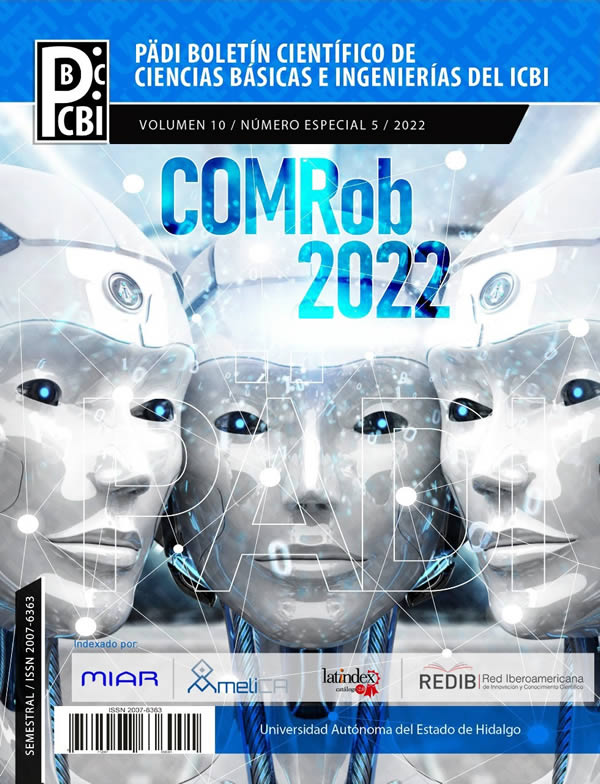Control neuro-robusto del sistema líder-seguidor de agentes móviles
DOI:
https://doi.org/10.29057/icbi.v10iEspecial5.10131Palabras clave:
Red Neuronal Recurrente de Alto Orden (RHONN), Robot Móvil Diferencial, Seguimiento Asintótico, Control Neuro-RobustoResumen
En este trabajo haciendo uso de linealización por retroalimentación de salida se propone un controlador neuro-robusto basado en una red neuronal recurrente de alto orden, para el seguimiento del robot móvil diferencial. El seguimiento se realiza en las velocidades angulares de las ruedas. La estrategia consiste en diseñar un controlador linealizante y un estimador basado en redes neuronales para estimar las incertidumbres paramétricas y posibles discrepancias en el modelo. De esta manera solo se requieren las velocidades angulares como variables de salida. Se presenta una simulación numérica para ilustrar la propuesta.
Descargas
Citas
Dhaouadi, R. y Hatan, A. A. (2013). Dynamic modelling of differential-drive mobile robots using lagrange and newton-euler methodologies: A unified framework. Advances in Robotics and Automation, 2:107.
Femat, R., Alvarez-Ramirez, J., Castillo-Toledo, B., y Gonzalez, J. (1999). On robust chaos suppression in a class of nondriven oscillators: application to the chua’s circuit. IEEE Transactions on Circuits and Systems I: Fundamental Theory and Applications, 46(9):1150–1152.
Femat, R. y Solis-Perales, G. (2008). Robust Synchronization Via Geometrical Control: A General Framework, pp. 99–137. Springer Berlin Heidelberg, Berlin, Heidelberg.
Hassan, N. y Saleem, A. (2022). Neural network-based adaptive controller for trajectory tracking of wheeled mobile robots. IEEE Access, 10:13582–13597.
Hikrobot, C. (2022). Latent mobile robot.
Hopfield, J. J. (1984). Neurons with graded responses have collective computational properties like those of two state neurons. Proc. Nat. Acad. Sci, 81:3088–3092.
iRobot Corporation (2022). Roomba.
Isidori, A. (1995). Nonlinear Control System. Springer-Verlag, 3 edición.
Khalil, H. (2002). Nonlinear Systems. Pearson Education. Prentice-Hall, Upper Saddle River, NJ, 3 edición.
Kosmatopoulos, E., Polycarpou, M., Christodoulou, M., e Ioannou, P. (1995). High-order neural network structures for identification of dynamical systems. IEEE Transactions on Neural Networks, 6(2):422–431.
Kosmatopoulus, E., Chistodoulou, M., e Ioannou, P. (1997). Dynamical neural networks that ensure identification error convergence. Neural Networks, 10(2):299–314.
KUKA (2022). Intelligent automated guided vehicle systems revolutionize the future of production.
Lian, K.-Y., Hsu, W.-H., y Tsai, T.-S. (2019). Leader-follower mobile robots control based on light source detection. IEEE Sensors Journal, 19(23):11142–11150.
Majid, N., Mohamed, Z., y Basri, A. (2016). Velocity control of a unicycle type of mobile robot using optimal pid controller. Jurnal Teknologi, 78.
Meng, J., Liu, A., Yang, Y., Wu, Z., y Xu, Q. (2018). Two-wheeled robot platform based on pid control. En 2018 5th International Conference on Information Science and Control Engineering (ICISCE), pp. 1011–1014.
Rabbani, M. J. y Memon, A. Y. (2021). Trajectory tracking and stabilization of nonholonomic wheeled mobile robot using recursive integral backstepping
control. Electronics, 10(16).
Ricalde, L. (2005). Inverse optimal adaptive recurrent neural control with constrained inputs. Tesis doctoral, Cinvestav.
Rovithakis, G. A. y Christodoulou, M. A. (2000). Adaptive control with recurrent high-order neural networks. Springer Verlag.
Soorki, M., Talebi, H., y Nikravesh, S. (2011). Robust leader-following formation control of multiple mobile robots using lyapunov redesign. En IECON 2011 - 37th Annual Conference of the IEEE Industrial Electronics Society, pp. 277–282.
Wang, Y., Cheng, L., Hou, Z., Yu, J., y Tan, M. (2016). Optimal formation of multi-robot systems based on recurrent neural network. IEEE Transaction on Neuronal Networks and Learning Systems, 27:322–333.



















